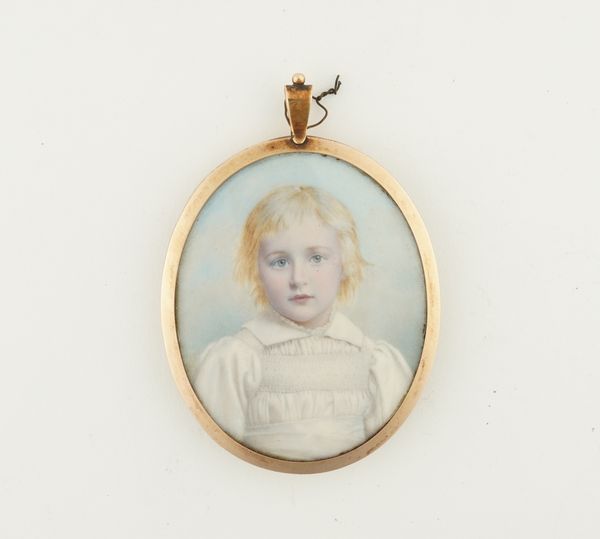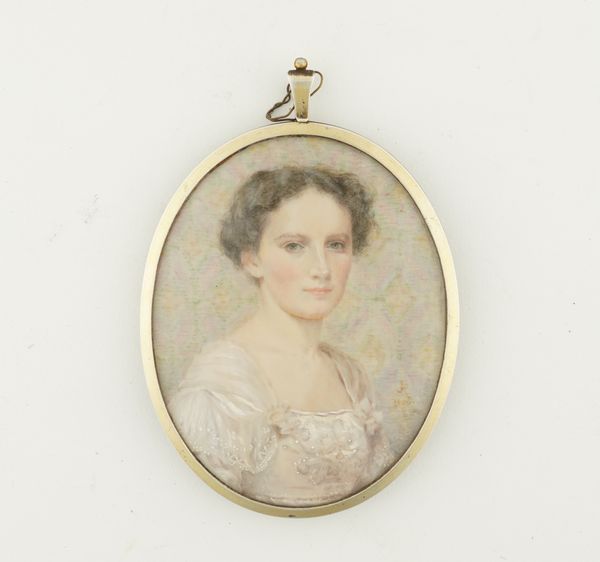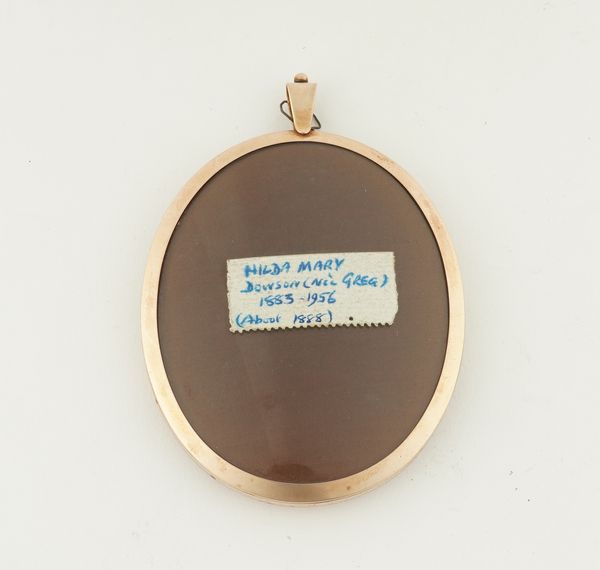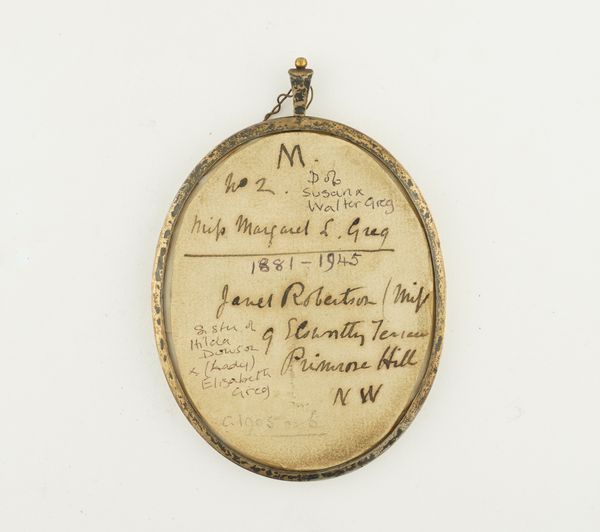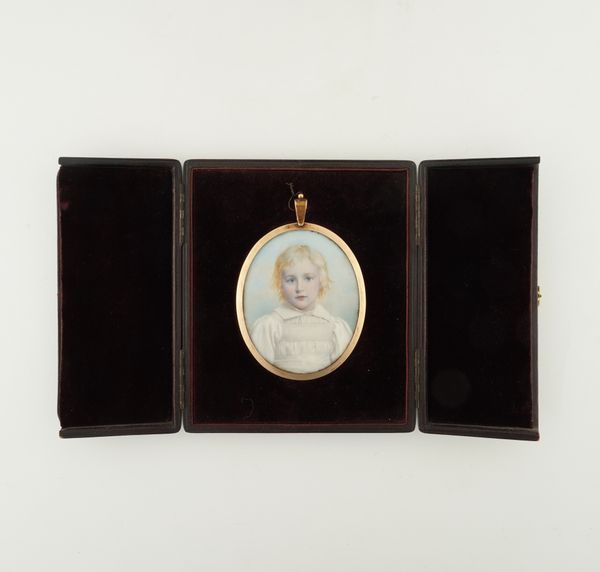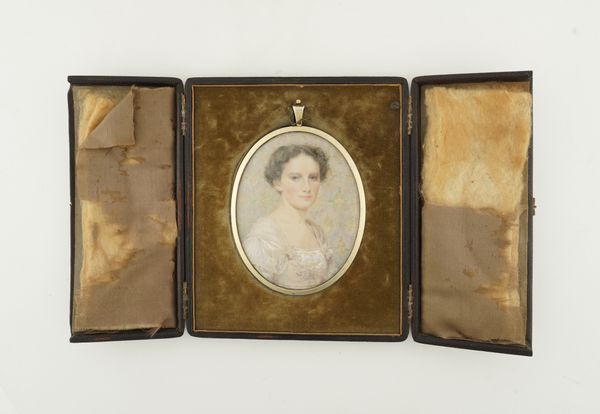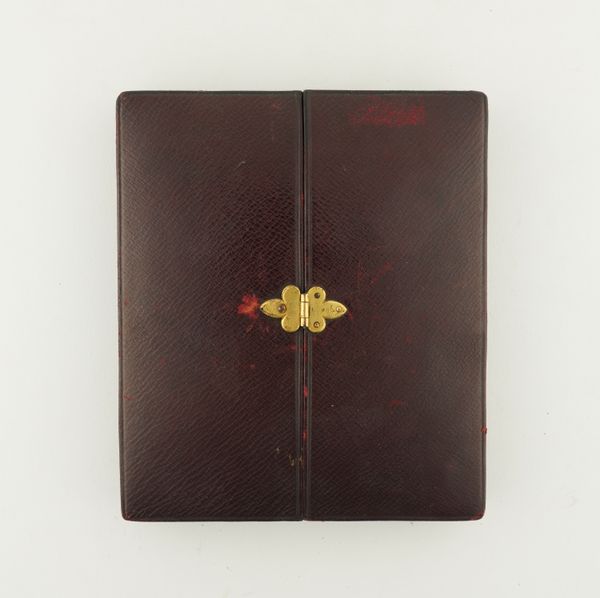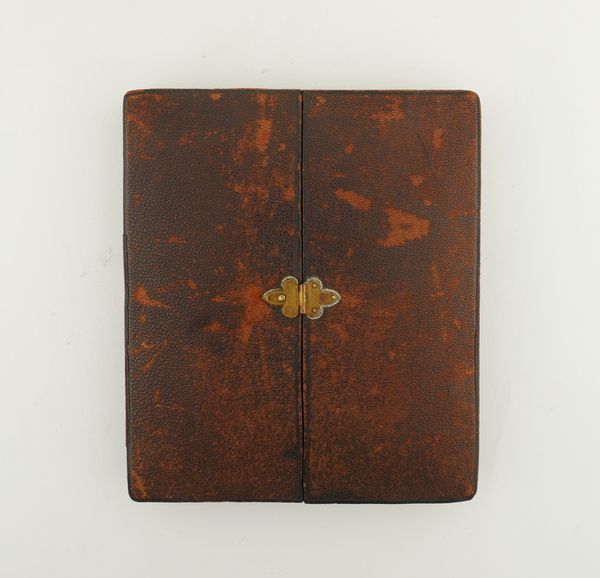ENGLISH SCHOOL, LATE 19TH CENTURY (2)
Portrait miniature of a young girl, thought to be Hilda Mary Dowson (née Greg) (1883-1956)
with inscribed label (attached to the back of frame)
on ivory (ref. WY1APGJS)
7.5cm
in a gilt-metal frame and with a case
together with a portrait miniature of a woman, thought to be Margaret Lilian Greg (1881-1945), on ivory (ref. RCC2592B), 9.3cm, in a gilt-metal frame and with a case
(2)
Provenance
Private collection, UK
| Estimate: | £300 - £500 |
| Hammer price: | £500 |
Footnote
Hilda Mary Dowson (née Greg) was born on 23 February 1883 in Wilmslow, Cheshire, to parents Walter and Susan Elizabeth (née Gaskell). She was baptised on 3 April 1883 at Styal Presbyterian Chapel in the parish of Wilmslow. Her father was a solicitor and in 1891 the family was living at Lee Hall, Mottram St Andrews, Cheshire, together with five servants. Lee Hall was a large house with twenty-five rooms. She had three siblings: Margaret Lilian, born in 1881, Elizabeth Gaskell born 11 December 1883 and Robert Lionel born 1893.
There is no trace of Hilda in the 1901 census. She married Gerard Septimus Dowson, a cousin, when she was twenty-two on 29 June 1905 at the parish church of Prestbury, Cheshire. Gerard was an estate agent born in Nottingham. Hilda and Gerard moved to The Manor House in Radcliffe on Trent in 1905, which they rented until 1921. The 1911 census records Hilda and Gerard living at Lee Hall with her widowed mother and her three unmarried children. Hilda’s sister Elizabeth is described as an art student; her brother Robert is also a student. The household now had nine servants including two nurses. It is not known how long Hilda and Gerard stayed at Lee Hall but newspaper reports reveal they were active in Nottingham in 1910 and 1913. In 1922 the Dowsons moved temporarily from The Manor House to The Chestnuts next door, before purchasing The Grange located on Main Road, Radcliffe on Trent, in 1924.
Women’s Suffrage Movement
The women’s suffrage campaign began in the 1860s and ended in 1928 when women gained full enfranchisement. The campaign started in Nottingham in 1871 when a Nottingham committee of the London National Society for Women’s Suffrage was founded. Its president was Richard Armstrong and secretary was Elizabeth Sunter. Anderson Brownsword chaired the first meeting, held in Nottingham. In 1872 the branch became associated with the new Central Committee of the National Society for Women’s Suffrage, the first national group to campaign for votes for women. In the 1880s and 1890s demand for votes for women was mainly sought via constitutional means. Alice Dowson (Hilda’s mother-in-law) had been one of the speakers at the ‘grand demonstration of women’ held in Nottingham in November 1881. She became secretary of the branch in February 1894. Helena Brownsword had married William Enfield Dowson, oldest son of Alice and brother of Gerard, in July 1884. She took over Alice’s role as secretary in 1896 when her mother-in-law’s health deteriorated. Helena eventually took the role of President with Hilda taking her place as secretary.
Hilda became involved with the Women’s Suffrage movement in Nottingham after she married Gerard Dowson in 1905. His mother Alice, sister Alice Maud, known as Maud, and sister-in-law Helena, known as Nellie, had been involved in the movement from very early on. At the same time Hilda’s mother, Susan Greg, and her sisters were active in the suffrage movement in Macclesfield. The Dowson and Greg families were closely connected. Alice Dowson, Gerard’s mother, was also Hilda’s aunt and sister of her father Walter.
The early 1900s saw the Nottingham Society become an active constituent of the National Union of Women’s Suffrage Society (NUWSS). In April 1908 two large suffrage meetings took place in Nottingham, Hilda being one of the organisers. Christabel Pankhurst spoke at one of the meetings. That same year Hilda travelled to London along with members of the Dowson family and supporters to a national Votes for Women demonstration held on June 13th. The event attracted crowds of 10,000 people, mainly women; the demonstrators marched through central London to the Albert Hall. It was deemed a success but unfortunately the Government of the day chose to ignore it. On December 4th 1908 the Derby branch of the NUWSS held its inaugural meeting. Hilda was one of the speakers and said that the vote “would provide a symbol of liberty and citizenship, a safeguard of one’s rights and privileges, and a powerful instrument to be used as occasion demanded.”
On 5 July 1909 the NUWSS organised a meeting in Nottingham Market Square with Mrs Henry Fawcett, Miss Eleanor Rathbone and Mr Edward Carpenter as speakers. The police had not attended the meeting although they had been requested and the speakers were unable to make themselves heard; the crowd was unruly and anti-suffrage feelings were made plain. In January 1910 there was a General Election and Hilda and her sisters-in-law went to the polling station at Lovers Lane schoolroom in Newark, hoping to get voters to sign petitions for their cause.
They had to stand outside and suffered abuse from the male voters. The Nottingham Evening Post reported on February 23rd that 8000 signatures in total had been collected by women outside Nottinghamshire’s polling stations, which were then presented to constituency members Lord Henry Bentinck and Mr. J.E. Ellis at the society’s office in Bridlesmith Gate. The Dowsons had managed to collect 2,232 signatures from the Rushcliffe district and Hilda’s husband, Gerard Dowson, was among those in the party receiving the petition. Both Lord Bentinck and Mr Ellis were in favour of women’s suffrage; Mr Ellis promised to present the petitions to parliament.
The Nottingham Evening Post also reported that the NUWSS held its annual meeting on May 31st 1910 at the Mikado café in Nottingham. Hilda and Helena Dowson were appointed joint secretaries. It was noted that there were now 200 branches of the NUWSS across the country and new branches had opened locally in Southwell, Newark and Hucknall. In July 1910 Hilda and other family members attended a demonstration in London to support the second reading of the suffrage bill (First Conciliation Bill).
A fete and sale of work was held in the gardens of the homes of Mr and Mrs William Dowson and Mrs Watson in The Park, Nottingham on 23 June 1910. It included a performance of ‘Lady Geraldine’s Speech’, a suffrage play arranged by Hilda. A suffrage shop was opened in Nottingham on Bridlesmith Gate selling campaign literature where Hilda was often to be found along with the rest of the family. By this time, the Women’s Social and Political Union (WSPU), which advocated militant action to gain votes for women, had attracted considerable support in Nottingham; the NUWSS distanced itself from the WSPU. Nevertheless, Hilda, now secretary of the Nottingham NUWSS, continued to be active in the suffrage movement. In 1911 she took part in a tour of Northamptonshire villages where she spoke at meetings on the suffrage question. In 1912 she organised two successful meetings in Bottesford and Bingham in which the suffragist newspaper ‘The Common Cause’ was sold. Her mother, Susan Greg, participated in a 1911 NUWSS demonstration in London of over 40,000 women. Her sister Margaret Greg was one of 50,000 women who joined a suffragist pilgrimage in 1913. They walked to London from all corners of the country where they were addressed at Hyde Park by Millicent Fawcett, leader of the NUWSS.. The aim of the pilgrimage was to show the country widespread support for ‘votes for women’ and that thousands were prepared to campaign legally and peacefully. Margaret wrote to Hilda while travelling and described the journey.
In July 1913 the Nottingham Daily Express reported that Hilda and Gerard had entertained members of the Nottingham Albert Hall Mission Cripples Guild to tea on the lawn at The Manor House in Radcliffe after a meeting that had been held at the Albert Hall. The Dowsons had hosted this event a number of times previously. After tea the children visited the recreation ground where they enjoyed playing, despite their various disabilities. The Rev John Cullen then invited them to watch a performance of ‘A Midsummers Nights’ Dream’ on the vicarage lawn. The play, produced by Hilda Dowson and Miss Green, had been performed previously on June 27th at the vicarage. The cast included Miss Violet Birkin playing the part of Hermia.
When war broke out in 1914 all branches of the suffrage movement suspended their public demonstrations and focused their activities on supporting the war effort. The movement became dormant but did not disappear; Hilda continued to be the secretary of the Nottingham branch of the NUWSS until at least 1916 (source The Common Cause, journal of the NUWSS).
During WWI the Dowsons arranged for The Manor House tennis courts to be dug up to grow vegetables; they were re-laid after the war ended. Hilda took part in the Patriotic Fair held in Nottingham Market Square at Whitsuntide 1917 together with her near neighbour, Claire Birkin, now Commandant of Notts.94 VAD, the vicar’s wife, three local doctor’s wives and others from Radcliffe. Hilda was a founder member of the Queen’s Nursing Association in Radcliffe and served as secretary when Claire Birkin of Lamcote House chaired the meetings.
Gerard Dowson was recorded by the Red Cross in September 1916 as a volunteer searcher, which involved identifying unknown wounded soldiers in British hospitals and linking them to families who had reported missing relatives. A notice in the London Gazette on 17 June 1917 states that he was created a temporary 2nd Lieutenant on 23 May 1917 with the 2nd Battalion of the Nottinghamshire Volunteer Regiment. It is thought that this citation indicates a position in the reserves of The Sherwood Foresters.
Hilda was the local secretary for the Cheshire branch of the RSPB prior and during the first world war.
The Dowson’s three children were born in the period covered by the First World War. Wanda Greg was born in July 1914, Rhona Penn on 16 June 1916 and Walter Felix Geldeston on 24 March 1918. The Dowson’s daughter Wanda was a talented painter and player of the mandolin but she contracted kidney disease at the age of ten and died aged fourteen on 3 October 1928. Her sister Rhona was sent to boarding school in Gerards Cross from 1929-1933 and then to Switzerland and Germany. She eventually became a PT instructor with a rank of Corporal in the ATS in April 1939. She studied physiotherapy at St Thomas’s hospital and then worked at Harlow Wood in Nottinghamshire. Walter Dowson, better known as Waldo, was educated at Gresham School in Holt, Norfolk and then at Oriel College, Oxford, where he studied Law.
Hilda continued to play an active part in the community after the end of the First World War and the government had granted women the vote, albeit only for women over thirty who were householders or wives of householders; she would have voted for the first time in the December 1918 election. She combined her interests in social affairs and causes with her flair for amateur dramatics. She was one of the founder members of the Radcliffe branch of the Women’s Institute becoming president from 1938 until 1953. She was chairman of the Radcliffe on Trent District Nursing Association until the formation of the NHS in 1948. She was a county magistrate sitting on the Bingham Bench for a number of years and a member of the Marriage Guidance Council, the Council for the Preservation of Rural England and a committee member of the Nottinghamshire Drama League. Her husband Gerard was chairman of Radcliffe on Trent Parish Council from 1941-1943 and a parish councillor for many years. He was also chairman of the school managers.
Between the wars Hilda and Gerard enjoyed traveling, visiting Jamaica in April 1920 and then sailing from Liverpool on a round cruise taking in Lisbon, Madeira and the Canary Islands in February 1929. In 1936 they visited Ceylon and Java. On their return Hilda gave a lantern lecture at Henley Hall in Mansfield. She showed a number of photographs and also souvenirs of their trip which included beautifully carved wooden heads, local materials, coral and a cheroot that the Javanese people smoked.
During the Second World War Hilda Dowson helped to form the Nottingham and Nottinghamshire Prisoner of War Relatives’ Association to provide comfort, help and advice to relatives of POWs. It also assisted with packaging and dispatching parcels to various prison camps in Europe and beyond. The headquarters were at 11 Fletcher Gate in Nottingham. The Association was particularly relevant to Hilda as her only son Waldo had been taken prisoner of war in 1940. He joined the TA in 1937 and was promoted to Lieutenant in the Sherwood Foresters in 1939. He was wounded and captured near Lillehammer in Norway whilst serving with the 8th Sherwood Foresters in 1940. He was originally in hospital in Oslo with facial wounds before being moved to Oflag 79 prisoner of war camp in Germany. Walter Dowson was released in 1945 and returned to Radcliffe in April of that year. In 1974 he gave the Minute Book of the Nottingham Suffrage Society to the Nottinghamshire Archives (source: Crawford, Elizabeth).
Hilda died on 7 July 1956, aged seventy-three, in Radcliffe. There is a plaque in The Manor House recording the fact that she had lived there from 1905-1921. Gerard Dowson died in December 1964, aged ninety. Waldo died on 31 March 1989 in Salcombe where he had been living with his sister Rhona. He left effects valued at £877,503. Rhona died on 4 December 2004 in Plymouth, Devon.
https://radcliffe-on-trent-local-history-society.co.uk/hilda-dowson-blue-plaque/
Prospective buyers should be aware that some countries have limitations on importing items made from endangered species, including materials such as coral, ivory, and tortoiseshell. Therefore, it is advisable for potential buyers to familiarize themselves with relevant customs regulations before placing bids, particularly if they intend to import this lot into another country.
